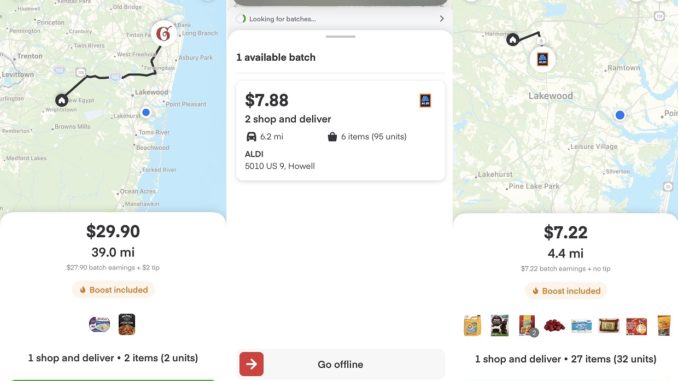
Instacart has made the transition from a private company to a publicly traded one. The company, owned by Maplebear Inc, offers a grocery pick-up and delivery service that has been around since 2012. Because of the 2020 pandemic and lockdown, its reach was greatly boosted. Having opened at $33 dollars a share, the stock price quickly dropped down to $30 per share on opening day. However, it won’t stop there. Disgruntled IC shoppers, low pay, the economy, and government intervention could lead to a precipitous drop in Instacart’s stock price.
When it comes to failing businesses, the experts like to point to cash flow and liquidity, loss of customers, inability to pay loans on time, incompetent leadership, or even an unclear business strategy. But while these are important, they are all bolstered up by one specific element that will make or break a business: employees. Without employees, your business won’t be able to generate cash or retain customers thus leading to poor or no cash flow and result in being unable to pay your bills.
I worked for Toys R Us/Babies R Us for 15 years and one of the biggest indicators of it failing was how it treated its employees. What once was a fun company to work for, with decent incentives, became a miserable cesspool of lower wages, barely any incentives, and incompetent management that created a workforce that was stressed, overworked, unappreciated, and taken advantage of at every turn. For a business that heavily relied on its employees being on point with stocking, maintaining, and, more importantly, engaging with customers this was the death knell. Suffice to say, the quality of employee work ethic, attitude, and customer engagement dropped (except when secret shoppers came in which could be spotted most of the time).
Obviously, there were other issues. Incompetent leadership, poor business strategy, and an inability to adapt to changing trends. But that incompetent leadership resulted in the poor treatment of employees. Poor business strategy came about because that same leadership refused to listen to its employees who had a better idea of what the customers wanted or were looking for. Sales targets were not being met because employees weren’t engaging with customers and, when they did, weren’t on point.
And when it gets to the point that the employee is essentially saying that they are just there for the paycheck, your business is over.
Without happy and satisfied employees, there was a loss of sales, loss of customers, and then the loss of business.
Thankfully, I bounced several years before the company finally went under.

Now I see a similar shift is happening with Instacart and its shoppers. IC Shoppers are becoming more disgruntled, especially after the recent changes in wages for them. Shortly before Instacart went public, the company changed the base batch pay from $7 to $4 which is a significant decrease when it comes to potential earnings for Shoppers.
When you take into account that not only is the Shopper spending time shopping for a customer, but using up their vehicle’s gas, which they paid for which, in turn, is putting more wear and tear on that vehicle, it really hurts. Especially since the price of gas is high right now and inflation continues to drive up the price for food and utilities which puts more stress on the employee.
Unsurprisingly, the response from Instacart Shoppers was bitter and angry. It was already difficult enough to make a decent wage from the gig. Now, it is almost impossible unless workers are willing to put insane hours into the hope of getting enough batches to make any kind of money. Money that was eaten away through the expenditure of gas for longer hours.
Up to this point, Instacart already seemed to have an issue with employee retention and the base $4 dollar batch pay has increased that issue. In addition, a significant amount of IC Shoppers could care less about the quality of their service or the satisfaction of the customer they are shopping for. More and more stories are being posted from dissatisfied Shoppers and customers alike in regards to this.
Let’s face it, seeing the number of low-paying orders that would take at least an hour to fulfill is disheartening to see. A Shopper making $5 for an hour’s worth of work is insane and demoralizing. Especially when you have to remember that the Shopper has to pay for the gas they are using as well. In turn, the new hires aren’t going to care about quality of service when the pay is so low.
Which brings up retention rates when it comes to the Shoppers and the customers. How many Shoppers are quitting over the low pay and ultra competitive locations? How many customers quit the platform when they have a bad experience? Especially when it comes to the low-paying batches?
There is also a reason why the motto “No Tip, No Trip” is a popular one amongst IC Shoppers. Low batch bay and no tip? The best Shoppers won’t touch it and only the bad ones will take it. Add on top of that multiple-batches where Instacart lumps a high tipper with low or no-tippers, sometimes the multi-batch order will also include different stores, means more time spent shopping and more driving, making such orders even less desirable unless the pay is high. Or a $10 order that has over 50 different items that will take at least an hour to shop, not to mention waiting in line, driving to the customer, and then driving back to a store to grab another order.
Suffice to say, Instacart has changed the service of being one of convenience and exclusivity to a service that might be convenient and is for anyone no matter how small the batch or tip. Small businesses are abusing the service to save dollars by making IC shoppers collect and deliver insane orders that will include 150 bananas while more frugal people are not paying a tip for small orders that aren’t worth a Shopper’s time unless they are very desperate for money or are unable to realize how much they are truly making when taking such orders.
Because of the poor wages surrounding Instacart, and the manipulated numbers Instacart is providing, local and federal governments will most likely step in to deal with it. Instacart has already been taken to court for underpaying delivery drivers, settled a lawsuit with San Francisco over health benefits, and there was even another lawsuit where the company disguised service fees as “tips.”
And it won’t stop there.
With the huge slash to batch pay just before the company went public, one has to ask, where did that $3 go? Did that get passed onto the customers to make Instacart more affordable or is Instacart pocketing that money to make it seem more profitable than it really is? Another potential reason for the drop in batch price is for Instacart to quickly get more customers because 30% of its revenue is ad based. Which wouldn’t be surprising since the company already has a history of shady business practices and additional allegations are coming from IC Shoppers that Instacart is skimming from their pay.
Let’s not forget that the economy isn’t doing well. In fact, it is going to get worse and IC Shoppers are already feeling it not just with little to no tips, but that there are hardly any orders, both good and bad, to fulfill. Meanwhile, under the Biden administration, it has become far more difficult to pay for the necessities: food, shelter, and essentials. Which means, people are going to cut costs wherever they can. Especially when customers factor in the “time saved” having someone else do the shopping and how much that convenience costs.
Instacart’s retention rate will suffer greatly as the economic challenges persist. As mentioned earlier, unhappy employees lead to a decrease in service quality, and this is exacerbated by the constant pressure to make ends meet. Instacart Shoppers are facing a harsh reality where low pay, high expenses, and minimal job satisfaction make this gig less appealing. As the economy tightens its grip, the incentive for Shoppers to continue working under these conditions diminishes even further. On top of that, Instacart is driving away its veteran Shoppers by allegedly manipulating their own algorithm so that the good orders go to new Shoppers while veterans see bad batches, bad orders, and deal with bad customers.
Government intervention is also looming on the horizon now that the company has gone public. Instacart’s track record of legal disputes and questionable business practices suggests that it may not escape regulatory scrutiny unscathed. The recent reduction in batch pay right before going public raises suspicions about the company’s motives. Are they truly trying to make the service more affordable for customers, or are they more interested in maintaining the appearance of profitability for their investors? The allegations of pay skimming by Instacart only add to the skepticism.
Moreover, the nature of Instacart’s business model makes it vulnerable to economic fluctuations and shifts in consumer behavior. As economic woes persist and consumers prioritize essentials over convenience, the demand for Instacart’s services will dwindle. Customers and Shoppers alike are going to reevaluate the value proposition of the platform.
Finally, the track record when it comes to gig economy businesses has not been a great one. So far, they have had problems when they became public. Uber, Lyft, and DoorDash haven’t had stellar performances when they finally went public. Not to mention that Uber and DoorDash are competing with Instacart for the same food delivery sector while major stores like Walmart, Shop Rite, and other stores are offering instore shopping services.
The storm clouds and carrion birds are gathering over Instacart’s stock price. The company’s treatment of its Shoppers, the economic downturn, government scrutiny, track record of previous company’s stock performances, and a shifting consumer landscape are all significant factors that could contribute to a rapid decline in its stock value. Just as I witnessed the downfall of a once-great company due to mistreatment of its employees, bad business practices, and failure to adapt to a volatile market, Instacart should heed these warning signs and prioritize its workforce and service quality to weather the challenges ahead. Otherwise, the stock price will continue to slide, leaving investors with a bitter taste of regret and people who rely on Instacart for their income out of work.
Author’s Note: Support this site by donating via Paypal or even checking out our merchandise on RedBubble where you can find designs that cater to writers and readers. Money donated and raised goes into paying for this website and equipment.
